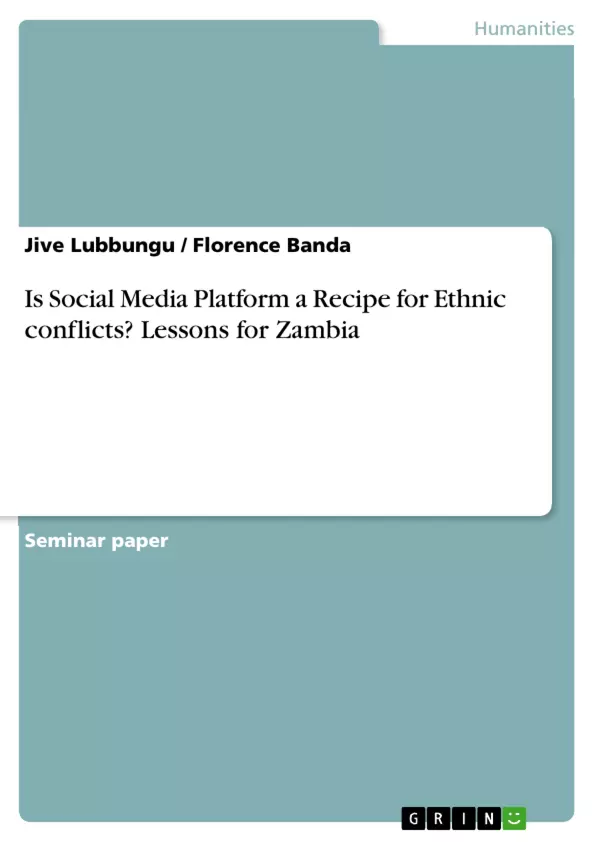The popularisation of social media through platforms such as Facebook has seen a corresponding increase in fake news, disinformation and hate speech in recent years. In some countries, social media platforms are being used as a tool to foment ethnic conflicts. The central argument of this study, therefore, is that Zambia is slowly diving into ethnic divisions propelled by unregulated social media platforms such as Facebook and WhatsApp. A scoping review was conducted on the role of social media in ethnic conflicts and its potential to disrupt state-building in Zambia. A comprehensive literature search was conducted on social media platforms as part of the scoping review. The study is informed by BojanBlagojevic's (2009) model to understand the causes and complexity of the ethnic conflict.
Inhaltsverzeichnis (Table of Contents)
- Introduction
- Literature Review
- Conceptual and Theoretical Framework
- Theoretical Framework
- Methodology
- Findings and Discussion
- Conclusion
Zielsetzung und Themenschwerpunkte (Objectives and Key Themes)
This study investigates the role of social media platforms, particularly Facebook and WhatsApp, in fueling ethnic divisions and potentially contributing to ethnic conflicts in Zambia. It examines the potential for these platforms to disrupt state-building processes and draws parallels with similar situations in other countries.
- The impact of social media on ethnic conflicts
- The role of social media in promoting hate speech, misinformation, and disinformation
- The connection between social media and the escalation of ethnic tensions
- The influence of political, social, cultural, and religious factors on ethnic conflicts
- The need for regulation and responsible use of social media platforms to prevent ethnic conflict
Zusammenfassung der Kapitel (Chapter Summaries)
- Introduction: This chapter provides a general overview of the significance of ethnic conflicts and their detrimental impact on socio-political development. It highlights the role of social media in exacerbating these conflicts and its potential to contribute to state instability.
- Literature Review: This chapter explores existing research on the relationship between social media and ethnic violence, drawing on case studies from countries such as Myanmar, Kenya, and Sri Lanka. It examines how social media platforms have been used to spread hate speech, manipulate public opinion, and incite violence.
- Conceptual and Theoretical Framework: This chapter presents Bojanna Blagojevic's model for understanding the causes of ethnic conflict, emphasizing the role of context, historical grievances, competition, intolerance, and their contribution to violent ethnic conflict.
Schlüsselwörter (Keywords)
The key terms and concepts explored in this text are: social media, ethnic conflicts, hate speech, platforms, Facebook, WhatsApp, state-building, disinformation, misinformation, and the potential for social media to disrupt peace and stability.
- Arbeit zitieren
- Jive Lubbungu (Autor:in), Florence Banda (Autor:in), 2021, Is Social Media Platform a Recipe for Ethnic conflicts? Lessons for Zambia, München, GRIN Verlag, https://www.grin.com/document/1038924



